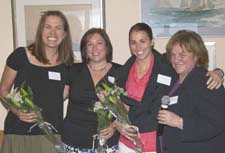On November 22, 2012 Dr. Frederick Mikelberg attended the joint graduate reception for the Master of Rehabilitation Science, and Master of Science and Doctor of Philosophy in Rehabilitation Science graduates. His speech is reproduced here with his permission.
I’m very pleased to be a part of this celebration of your accomplishment. And I am very much aware that a speech from the Vice Dean is not what makes this day special for you.
It’s probably fair to say that I was more eager to speak to you today than you were eager to hear me, because I am very new to my role as Vice Dean. And since representing the Faculty of Medicine, at events like this, is now one of my responsibilities, I need all the practice I can get.
But I also have a personal connection to rehabilitation sciences that added to my eagerness. My wife, before stepping out of the workforce, was a physical therapist herself. I can tell you that physical therapy was a profession and calling that she took to heart. So if there is one insight I can bring to you today, it is this: Rehabilitation professionals make for good partners. But then, you probably already knew that.
One thing you also probably know, as rehabilitation professionals: The range of your expertise, and the significance of your role in our health system, is so much greater than the public truly comprehends. This, too, I learned from my wife. And believe me, she does not let me forget it.
- Helping people cope with chronic illness, such as COPD…
- Helping others adapt to permanent disabilities such as spinal cord injury…
- Or to regain basic movement after a stroke…
These are weighty responsibilities.
By providing care for people in such a wide range of circumstances, and often desperate circumstances at that, each of you serves as ambassadors of the profession, representing the power of occupational therapy and physical therapy to help individuals regain some or all of what they have lost. As you continue your careers, I urge you to embrace that role.
Approach every new patient, and their families, as persons to be enlightened through the quality of your care.
In the process, I urge you to approach every new patient as someone who can teach you a thing or two.
Maybe those lessons will be about the human condition – about vulnerability, resilience, stubbornness, or about our responsiveness to simple but heartfelt words of encouragement.
Or maybe those lessons will be about the limits of your own knowledge.
Yes, it’s true. Even though you have earned advanced degrees, your education is far from over. There are still major gaps in your knowledge of rehabilitation science, and the roles it can play in our health care system. But that should come as a bit of a relief, because none of us – no matter how long we have practiced – can be expected to know all there is to know.
What’s most important is that you know the pathways to access the information you need, and to access the people who might be able to help you with this piece or that. Don’t be afraid to let your patients, as well as collaborating health care professionals, see that dimension of your work.
It’s better to show them your curiosity, your determination and your commitment, than to get caught up in maintaining a façade of omnipotence. Having pursued advanced knowledge about rehabilitation, I have no doubt that you — more than most people — realize that there’s always more to learn.
And you should be particularly proud that you are helping to contribute to the corpus of research in rehabilitation science, thus helping the various professions included under that umbrella to come into their own, and most likely, evolve even more dimensions.
So perhaps I’m preaching to the choir here. Maybe that’s just an unavoidable hazard of graduation speeches. Or maybe it’s a rookie’s mistake. But that shouldn’t detract from its importance, and its relevance to the rest of your careers. So before I commit the other rookie’s mistake of going on too long, I would like to extend my congratulations to you, and to let you know how proud I am of your accomplishment, and of your contribution to our scholarship in the health sciences.
Good luck to you.

